

Path dependence. Path dependence explains how the set of decisions one faces for any given circumstance is limited by the decisions one has made in the past or by the events that one has experienced, even though past circumstances may no longer be relevant.[1] In economics and the social sciences, path dependence can refer either to outcomes at a single moment in time, or to long-run equilibria of a process.
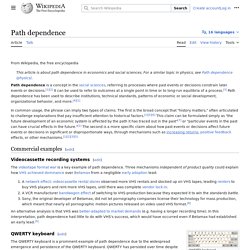
In common usage, the phrase implies either: (A) that "history matters" — a broad concept,[2] or(B) that predictable amplifications of small differences are a disproportionate cause of later circumstances, and, in the "strong" form, that this historical hang-over is inefficient.[3] In the first usage, (A), "history matters" is trivially true in many contexts; everything has causes, and sometimes different causes lead to different outcomes. It is the narrow concept (B), that has the most explanatory force, and which is covered in this article. Illustration[edit] The videotape format war is an example. Winnicott und Arendt. Dialog - soft power tool? Dialog zum Angstabbau. David Bohm. David Joseph Bohm FRS[1] (; 20 December 1917 – 27 October 1992) was an American scientist who has been described as one of the most significant theoretical physicists of the 20th century[2] and who contributed unorthodox ideas to quantum theory, neuropsychology and the philosophy of mind.
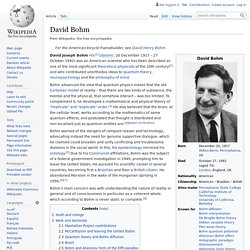
Bohm warned of the dangers of rampant reason and technology, advocating instead the need for genuine supportive dialogue, which he claimed could broaden and unify conflicting and troublesome divisions in the social world. In this, his epistemology mirrored his ontology.[5] Due to his Communist affiliations, Bohm was the subject of a federal government investigation in 1949, prompting him to leave the United States. He pursued his scientific career in several countries, becoming first a Brazilian and then a British citizen. Global consulting for visionary leaders and organizations. William Isaacs is Founder and President of Dialogos, a leadership consulting and strategy development firm based in Cambridge, MA.
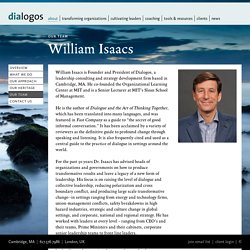
He co-founded the Organizational Learning Center at MIT and is a Senior Lecturer at MIT’s Sloan School of Management. He is the author of Dialogue and the Art of Thinking Together, which has been translated into many languages, and was featured in Fast Company as a guide to “the secret of good informal conversation.” It has been acclaimed by a variety of reviewers as the definitive guide to profound change through speaking and listening. Dialektik vs Dialog. Nicht die Art von Dialog, um die es uns geht - Prison Dialogue. Huntington Clash. Dialogic. The English terms dialogic and dialogism often refer to the concept used by the Russian philosopher Mikhail Bakhtin in his work of literary theory, The Dialogic Imagination.
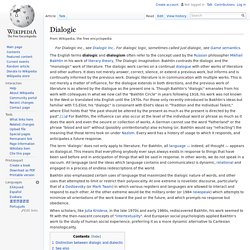
Bakhtin contrasts the dialogic and the "monologic" work of literature. The dialogic work carries on a continual dialogue with other works of literature and other authors. It does not merely answer, correct, silence, or extend a previous work, but informs and is continually informed by the previous work. Dialogic literature is in communication with multiple works. This is not merely a matter of influence, for the dialogue extends in both directions, and the previous work of literature is as altered by the dialogue as the present one is. The term 'dialogic' does not only apply to literature. Bakhtin also emphasized certain uses of language that maximized the dialogic nature of words, and other uses that attempted to limit or restrict their polyvocality. Distinction between dialogic and dialectic[edit] See also[edit]
Intercultural Lexicon: Dialogue - Fred Dallmayr. In recent times, "dialogue" has emerged as an important and even central notion in both philosophy and politics.
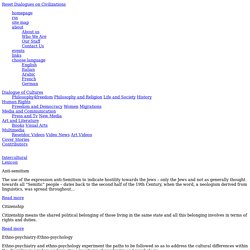
We speak of a "dialogue among civilizations" in opposition to a "clash of civilizations", and of a "dialogue among religions" as an antidote to the "clash of fundamentalisms". Why has dialogue emerged as such a crucial term today? Because it denotes the opposite of unilateralism and monologue. Because it carries the connotation of collaboration and mutual respect - and thus offers a guidepost to inter-personal and inter-societal concord and peace. The term is also very important philosophically. Dialog ist die Anerkennung, dass der Weg des anderen ebensogut bestritten werden kann, wie der eigene.
Erklären, ohne Überzeugen zu wollen. Dialog als Pflicht. Dialog führt man, wenn man aufeinander angewiesen ist. Dialog bedeutet, festhalten können, ohne durchsetzen zu müssen.
Dialog ist eine Beziehung. Dialogue is not conflict resolution. Voices for Dialogue. Definition 1. Dialog Definition 2. Erlaubt Komplexität. Dialog erlaubt Fragen, ermöglicht Kennenlernen. Dialog verlangt Ebenbürtigkeit. Ist Dialog eine vorwissenschaftliche Methode? "Im Dialog die unbeweisbaren Dinge des Lebens umkreisen" Hans-Georg Gadamer. Hans-Georg Gadamer (; German: [ˈɡaːdamɐ]; February 11, 1900 – March 13, 2002) was a German philosopher of the continental tradition, best known for his 1960 magnum opus Truth and Method (Wahrheit und Methode) on hermeneutics.
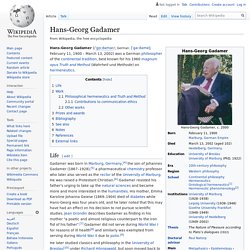
Life[edit] He later studied classics and philosophy in the University of Breslau under Richard Hönigswald, but soon moved back to the University of Marburg to study with the Neo-Kantian philosophers Paul Natorp (his doctoral thesis advisor) and Nicolai Hartmann. He defended his dissertation The Essence of Pleasure in Plato's Dialogues (Das Wesen der Lust nach den Platonischen Dialogen) in 1922. Shortly thereafter, Gadamer moved to Freiburg University and began studying with Martin Heidegger, who was then a promising young scholar who had not yet received a professorship.